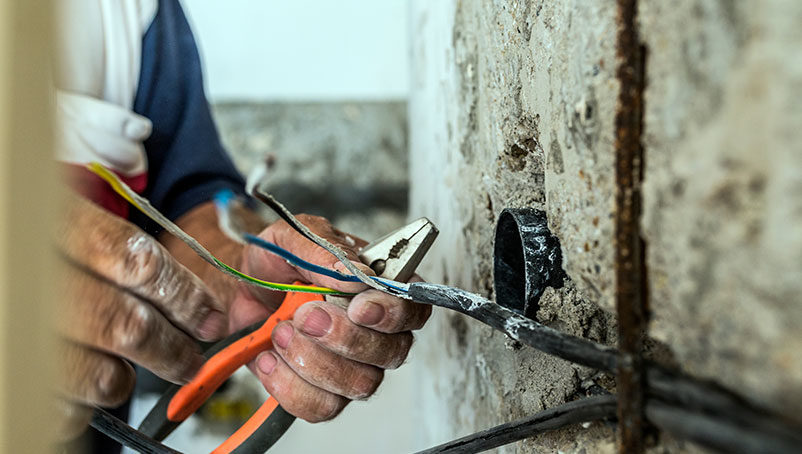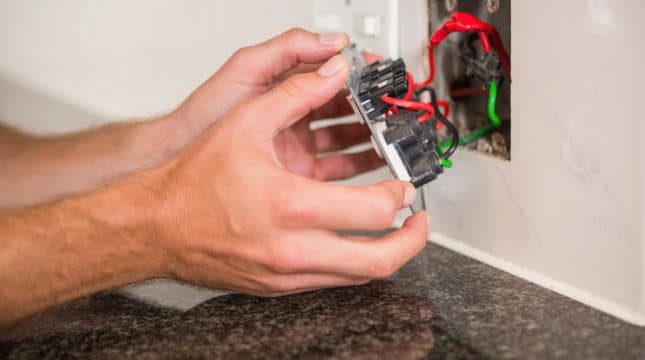1. Home office deductions
Many electricians who are sole proprietors use their homes to store business property or manage the administrative side of their operations. If you have dedicated a section of your home for business use, the Internal Revenue Service (IRS) allows what’s known as a home office deduction.
There are two ways to calculate this deduction, and your accountant or tax software will reveal which method yields the more significant write-off.
You can use the regular method, which divides the square footage exclusively devoted to your business by the total square footage of your home. You can then apply that percentage to utilities, home insurance, property taxes and mortgage interest. You can also deduct depreciation on your home.
Of course, keeping track of all those expenses throughout the year can be tricky (although they might yield a larger deduction if you do), which is why there is also the simplified option. This option allows a deduction of five dollars per square foot of dedicated business space, up to 300 square feet.
2. Business insurance premiums
As an electrician, you might need a license to stay in business, and you’re probably required to have insurance to maintain that license. Even if it’s not required for the job, having insurance is smart business and an easy and affordable way to protect the business you’ve built.
Luckily, when it comes to business insurance, the costs are deductible. That’s one more item you can check off your electrician tax deduction checklist. Here are some typical forms of business insurance that are useful for electricians and usually tax deductible:
- General liability insurance helps protect clients from damages to their homes and any injuries to non-employees.
- Workers’ compensation is required in most states if you have employees. It covers medical-related accidents and expenses — even missed wages.
- Commercial property and commercial auto insurance are relevant if you have commercial property and commercial vehicles. If you do, you are required to have these forms of insurance. They are tax-deductible.
Whether you keep general liability insurance to help protect you when working on other people’s property or carry workers’ compensation insurance to help ensure your employees are covered in case of an accident, you can write off the costs.
3. Vehicle expenses, mileage and travel expenses
Jonathan Cobey, CEO and financial professional at Cash Homebuyer Charlotte, advises electricians to take advantage of vehicle expense and mileage deductions.
“Since most tradespeople travel to numerous job sites throughout the day, sometimes lugging heavy tools or materials,” he explains. “They either can choose a standard mileage deduction or write off actual expenses for gas, insurance, repairs, and even depreciation if they own the vehicle.”
Like the home office deduction, you have two options to consider.
During the calendar or fiscal year, you can keep track of all the expenses shelled out for your business vehicle, including gas, oil, tires, repairs, etc. The total you arrive at (with receipts to back it up!) may be deducted as a business expense.
On the other hand, you can just keep track of your business mileage and take the IRS rate of 65.5 cents per mile as your deduction. Like the home office deduction, you’ll want to use the method that gives you the largest write-off.
Regarding vehicles, it’s worth noting that purchasing a light truck or SUV also affords you some considerable tax advantages. Vehicles with a rating that equals or exceeds 6,000 lbs. in gross vehicle weight rating (GVWR) are eligible for a tax deduction that can amount to 100% of the purchase price. However, if you buy a $30,000 pickup and use it 80% of the time for business, you can only write off $24,000 or the percentage of cost related to business use.
Additionally, document the expenses related to the commercial auto insurance you must purchase for your vehicle. You can deduct expenses related to business insurance.
4. Equipment and supplies
Cobey explains that electricians can deduct many business-related expenses through equipment and supply deductions. “This can include anything from buying and maintaining any necessary items, such as power tools, special machinery, safety gear, work attire, and the like, that can be deducted.”
“In most cases, such expenses are required to perform day-to-day operations; these may fully be deductible if deemed necessary and not reimbursed by an employer, according to professionals with the IRS,” he says. However, depending on the cost of the equipment, you may need to spread the deduction out over several years.
It all depends on the useful life of the asset. You can buy office supplies such as printer ink and take the total purchase amount right off your taxable income.
With an asset expected to last five years or more, such as a supply shed, you’ll need to depreciate the item and spread the cost out according to the useful life in years that the IRS applies to the structure.
If you store your equipment and supplies in a commercial space or warehouse, you will need commercial property insurance. This insurance protects the space and all equipment and inventory inside, and it is deductible as well.
5. Utilities for electricians
We looked at utilities as part of the home office tax deduction, but the amount you can deduct changes when you own a building devoted exclusively to your business pursuits.
You may own a small garage or storefront where you store tools and park your van. Unlike a home office where you can only take a percentage of the utilities when you own a separate space for business, you can deduct every dollar.
You might even use space in that building for an office. As long as the building is entirely dedicated to your business, you can deduct from your business income everything you spend on heating, cooling, water, electricity, internet, phones, and more.
6. Self-employment taxes
By now, you’re aware that paying taxes is all on you.
As a self-employed electrician, you will need to pay quarterly estimated income taxes based on the amount you’ve earned and expect to earn for the balance of the year.
In addition to federal income tax obligations, you’ll also notice that payroll deductions for Social Security and Medicare are supplanted by a self-employment tax, which is 15.3% in total of 2023 net earnings up to $142,800.
This 15.3% comes because you are paying taxes as an employee and an employer as a self-employed individual. Knowing this to be a bit unfair, once you calculate the self-employment taxes you owe, the IRS allows you to deduct half of that self-employment tax figure from your taxable income.
Consult with a tax professional about specific tax write-off, withholding or other income tax issues.
7. Sales and marketing
You need to let the public know what you do and where you’re located, so electrician marketing and advertising ideas are a worthy investment.
Whether you choose print, promotional items, radio or paid social media campaigns, know that the entire cost comes off the top of your taxable income.
That means if you brought in $100,000 worth of revenue in a year and spent $12,000 in marketing and advertising costs, your taxable liability immediately decreases to $88,000 (Without even considering all the other deductions we just went over!).






